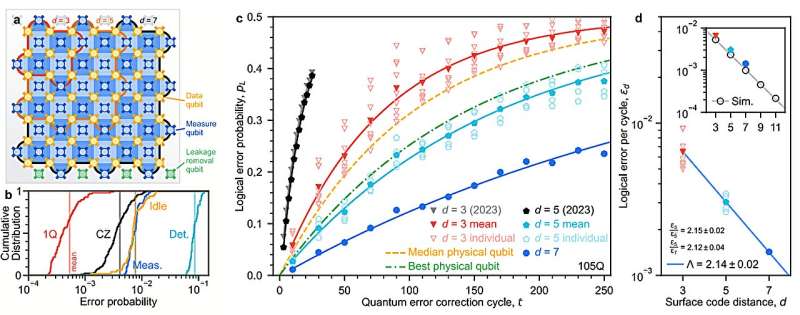
September 11, 2024 by Bob Yirka , Phys.org
Collected at: https://phys.org/news/2024-09-google-quantum-ai-memory-greatly.html
A team of computer scientists at Google Quantum AI has demonstrated a type of quantum memory for a quantum computer that produces far fewer errors than others. The group has published a paper on the arXiv preprint server describing their new memory system, how it works, and the degree to which it is capable of reducing error rates.
Prior research has shown that an error-free quantum computer could perform tasks far beyond the capacity of modern supercomputers. However, due to the nature of quantum phenomena, quantum computers produce too many errors to be practical.
Scientists at big-name companies such as Microsoft and Google are seeking methods to prevent the machines from producing so many errors or better ways to correct those that occur. In this new effort, the team at Google has made progress on the latter approach.
Quantum computers are made with different types of technology, though all are based on using quantum bits. Most start with physical qubits and then use those to make logical qubits.
The team at Google has been working with a quantum computer that uses multiple physical bits to create one logical qubit and have developed an algorithm that they call “surface code” to correct errors. It does so by making use of the structure of the underlying physical qubits. The team at Google claims it reduces errors better than other quantum error-correcting systems.
In testing, the research team also found that the algorithm did an increasingly better job of correcting errors as the number of logical qubits increased—in their case, jumping from 72 to 105. This finding, the team notes, suggests that adding more qubits will improve correction even more, a scheme that could, in theory, lead to the development of a quantum computer with few enough errors to prove truly useful.
As a side note, the researchers point out that the lifetime of the logical qubits in their computer was longer than the lifetime of the underlying physical qubits, which, they note, suggests the system is able to build a reliable quantum memory.
More information: Rajeev Acharya et al, Quantum error correction below the surface code threshold, arXiv (2024). DOI: 10.48550/arxiv.2408.13687
Journal information: arXiv

Leave a Reply